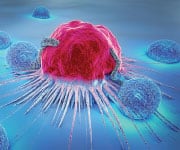Life Extension Magazine®
Evidence published over 30 years ago indicated that people who consumed higher amounts of dietary lycopene had lower site-specific cancer rates.1-4
In the past year, an impressive number of studies have been published about how lycopene can slow or impede cancer progression.
These new publications point to a variety of roles for lycopene in colorectal, skin, and ovarian cancers, while also shedding new light on its underlying benefits.5-8
These studies show that lycopene directly affects steps involved in cancer development and growth—while also helping prevent tumors from metastasizing.
Cancer remains the second leading cause of death among Americans, affecting more than 21 million (nearly 9%) of us at any given time.9 That makes chemoprevention with plant extracts like lycopene a necessity for anyone wanting to beat the odds.
Life Extension® was the first to introduce lycopene in a dietary supplement formula in 1985 based on its anti-cancer properties. Since then, it has become a popular nutrient widely available.
What you need to know
Lycopene, a carotenoid found in tomatoes, has been documented in a number of peer-reviewed research since it was first introduced in 1985. Most of the findings on lycopene have been on its abilities to modulate cell growth, replication and death. A recent large-scale clinical trial found that those with the highest intake of lycopene had a 64 percent reduced risk of colorectal cancer compared with those with the lowest intake.
Lycopene Fights a Variety of Cancers

Cancer cells share certain properties that make them different from cells in healthy tissue.
For example, cancer cells lose the ability to control normal replication.
Unlike normal cells, most cancer cells continue to replicate out of control even when they encounter normal cells.
Cancer cells are also capable of squeezing through adjoining tissue to cause local invasion or distant metastases.
Lycopene, a carotenoid molecule found in tomatoes, works at all three of those cellular and molecular levels, making it a potential weapon against a wide variety of cancers.
Colorectal Cancer
A 2017 review of the literature on lycopene and colorectal cancer showed that lycopene has specific effects on two key aspects of cancer development:5
- Proliferation – the rapid and uncontrolled growth of cells that follows a cancer-inducing mutation, and
- Progression – the events that must occur to keep a growing ball of malignant cells supplied with blood, and that permit the tumor mass to invade local tissues or to break away and spread to distant parts of the body.
Lycopene's beneficial effects arise in part from its ability to interact with signaling pathways that modulate cell growth, replication, and death.5
For example, lycopene has the ability to influence the levels of a pro-cancer signal called insulin-like growth factor-1 (IGF-1).10 A human study showed that 30 mg of lycopene daily reduced IGF-1 levels by 25% compared to baseline.10
In a large case-controlled study that evaluated more than 1,000 individuals, researchers found that people with higher lycopene levels had lower risks of developing colon malignancies.8
Specifically, those with lycopene levels in the highest quarter had a 64% lower risk of colorectal cancer compared with those in the lowest quarter.
This kind of large, well-designed study adds strength to the evidence for lycopene's role in protecting against colon and rectal cancer.
Ovarian Cancer
Ovarian cancer is a prevalent malignancy of the female reproductive tract.11 Lycopene has been shown to help protect against this deadly cancer, including reducing the growth and spread of tumors.
Researchers in Australia evaluated the impact of lycopene supplementation in mice that were implanted with human ovarian cancer cells.7 They found that lycopene significantly reduced the size and number of tumors in the mice, while also significantly impeding the tumor from spreading. Metastatic cancers are usually fatal, so any therapy that lowers the risk of spreading is a great asset in the fight against cancer mortality.7
In addition, lycopene treatment significantly reduced the number of proliferating (rapidly growing) cancer cells, thereby slowing the growth of the tumor itself. It also decreased the expression of proteins used in the growth of the cancer cells and in tissue invasion—an important action that further weakens a cancer's ability to force its way into surrounding tissues and to generate deadly metastases.7
Finally, when researchers gave tumor-bearing mice lycopene in addition to two common chemotherapy drugs (paclitaxel and carboplatin), the lycopene synergistically enhanced the drugs' antitumor effects. This raised the possibility that such therapy might allow for lower doses of the toxic chemotherapy drugs required to achieve a successful remission.7
Studies like this demonstrate the potential for thoughtful nutrient supplementation to help overcome this deadly threat to women.
Skin Cancer
Ultraviolet (UV) light-induced skin cancers may yield to the chemopreventive properties of lycopene.6
To test this, researchers grew skin cells called keratinocytes in culture and then exposed them to UV radiation at levels known to induce cancerous mutations.6 As expected, UV-exposed cells began a phase of hyperproliferation, meaning they reproduced rapidly while losing their ability to self-destruct (called apoptosis).
But treating the cells with lycopene prior to UV exposure significantly reduced those cancerous changes. That's because lycopene helped reorient the cells' nuclei to more natural rates of replication, while restoring their ability to die off by apoptosis.6
This study adds credibility to the emerging idea that one can provide significant skin cancer protection from within—and further suggests the wisdom of regular lycopene supplementation as a means of protecting one's entire body from malignant changes.
In fact, in addition to the types of cancer already mentioned, some previous studies have shown preventive effects of lycopene against prostate and breast cancer, further evidencing the full-body potential of lycopene as a chemopreventive agent.10,12-18
Summary

Lycopene has demonstrated direct effects on the steps involved in tumor development and growth—especially invasion and metastasis.
Evidence published over 30 years ago indicated that people who consumed higher amounts of lycopene from food had lower specific-site cancer rates.1-4
In recently published studies, lycopene has been found to combat a variety of cancers, including colorectal, ovarian, and skin cancers.
Lycopene may even enhance the effect of chemotherapy drugs, potentially reducing the dose necessary to achieve a successful remission.
Based on its varied beneficial effects on factors involved in malignant transformations, the evidence for lycopene's anticancer properties continues to expand.
If you have any questions on the scientific content of this article, please call a Life Extension® Wellness Specialist at 1-866-864-3027.
References
- .Colditz GA, Branch LG, Lipnick RJ, et al. Increased green and yellow vegetable intake and lowered cancer deaths in an elderly population. Am J Clin Nutr. 1985;41(1):32-6.
- Le Marchand L, Yoshizawa CN, Kolonel LN, et al. Vegetable Consumption and Lung Cancer Risk: A Population-Based Case-Control Study in Hawaii. JNCI: Journal of the National Cancer Institute. 1989;81(15):1158-64.
- Burney PG, Comstock GW, Morris JS. Serologic precursors of cancer: serum micronutrients and the subsequent risk of pancreatic cancer. The American Journal of Clinical Nutrition. 1989;49(5):895-900.
- Helzlsouer KJ, Comstock GW, Morris JS. Selenium, lycopene, alpha-tocopherol, beta-carotene, retinol, and subsequent bladder cancer. Cancer Res. 1989;49(21):6144-8.
- Carini F, David S, Tomasello G, et al. Colorectal cancer: an update on the effects of lycopene on tumor progression and cell proliferation. J Biol Regul Homeost Agents. 2017;31(3):769-74.
- Chen P, Xu S, Qu J. Lycopene Protects Keratinocytes Against UVB Radiation-Induced Carcinogenesis via Negative Regulation of FOXO3a Through the mTORC2/AKT Signaling Pathway. J Cell Biochem. 2018;119(1):366-77.
- Holzapfel NP, Shokoohmand A, Wagner F, et al. Lycopene reduces ovarian tumor growth and intraperitoneal metastatic load. Am J Cancer Res. 2017;7(6):1322-36.
- Huang J, Lu MS, Fang YJ, et al. Serum carotenoids and colorectal cancer risk: A case-control study in Guangdong, China. Mol Nutr Food Res. 2017;61(10).
- Available at: https://www.cdc.gov/nchs/fastats/cancer.htm. Accessed 9 September, 2017.
- Walfisch S, Walfisch Y, Kirilov E, et al. Tomato lycopene extract supplementation decreases insulin-like growth factor-I levels in colon cancer patients. Eur J Cancer Prev. 2007;16(4):298-303.
- Available at: https://www.cdc.gov/cancer/ovarian/index.htm. Accessed 9 September, 2017.
- Barber NJ, Zhang X, Zhu G, et al. Lycopene inhibits DNA synthesis in primary prostate epithelial cells in vitro and its administration is associated with a reduced prostate-specific antigen velocity in a phase II clinical study. Prostate Cancer Prostatic Dis. 2006;9(4):407-13.
- Bhatia N, Gupta P, Singh B, et al. Lycopene Enriched Tomato Extract Inhibits Hypoxia, Angiogenesis, and Metastatic Markers in early Stage N-Nitrosodiethylamine Induced Hepatocellular Carcinoma. Nutr Cancer. 2015;67(8):1268-75.
- Kucuk O, Sarkar FH, Djuric Z, et al. Effects of lycopene supplementation in patients with localized prostate cancer. Exp Biol Med (Maywood). 2002;227(10):881-5.
- Mariani S, Lionetto L, Cavallari M, et al. Low prostate concentration of lycopene is associated with development of prostate cancer in patients with high-grade prostatic intraepithelial neoplasia. Int J Mol Sci. 2014;15(1):1433-40.
- Talvas J, Caris-Veyrat C, Guy L, et al. Differential effects of lycopene consumed in tomato paste and lycopene in the form of a purified extract on target genes of cancer prostatic cells. Am J Clin Nutr. 2010;91(6):1716-24.
- Zhang X, Wang Q, Neil B, et al. Effect of lycopene on androgen receptor and prostate-specific antigen velocity. Chin Med J (Engl). 2010;123(16):2231-6.
- Eliassen AH, Hendrickson SJ, Brinton LA, et al. Circulating Carotenoids and Risk of Breast Cancer: Pooled Analysis of Eight Prospective Studies. JNCI: Journal of the National Cancer Institute. 2012;104(24):1905-16.

